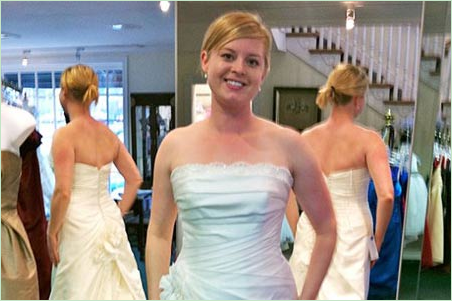
Kjerstin Gruys, a 29-year-old PhD student in sociology, has mastered the art of avoiding her own reflection. For months, her daily schedule began with the typical teeth brushing, but a curtain covered the bathroom mirror. She inserted her contact lenses and applied her makeup by touch, not sight. Driving to work required glances in the rear- and side-view mirrors, but Gruys avoided peeking at her own image.
现年29岁的柯基丝汀•格鲁伊斯是一名社会学博士研究生,她已经精通了不照镜子的艺术。几个月以来,她每天早起刷牙时都用帘子盖住浴室的镜子。她不看镜子,而是靠感觉给自己戴隐形眼镜和化妆。开车上班时需要不时扫一下后视镜和侧视镜,但是格鲁伊斯也尽量不去看自己在镜中的影像。
It was part of a unique experiment that Gruys hopes will help boost her own self-esteem and inspire others to stop focusing on external perfection. In her blog "Mirror, Mirror Off the Wall", she documents her yearlong effort to live mirror-free.
这是一项独特实验的一部分,格鲁伊斯希望这一实验能帮助她增强自信心,并鼓励他人不要过分关注外在的完美。在她的博客“镜子,把镜子从墙上拿掉”中,她记录了自己长达一年没有镜子的生活。
The project had its roots in Gruys' struggles with body image and her experience overcoming an eating disorder. In high school, Gruys said, she had insecurities about her appearance and suffered from anorexia.
在这一计划诞生前,格鲁伊斯曾有过一段极力保持身材、患上和治疗饮食失调症的过往。格鲁伊斯说,她在高中时对自己的外貌非常不自信,还患上了厌食症。
Gruys launched her no-mirrors project in March 2010, while planning her wedding to then fiancé Michael Ackermann. Wedding dress shopping was not the pleasure-filled experience that she had expected. But instead, Gruys says dress shopping was a source of stress.
格鲁伊斯于2010年三月开始了她的无镜计划,那时她正在筹备自己和未婚夫迈克尔•阿克曼的婚礼。在婚纱店选购结婚礼服的经历并不如她想象的那样充满乐趣,与之相反,格鲁伊斯说,选购婚纱对她而言就是压力之源。
"I saw myself in the mirror and was being critical," she says. "I thought, well, maybe I should lose a little weight before the wedding, always a bad thing to focus on when you have a history of an eating disorder.”
她说:“我看到了镜中的自己,对自己的形象多有不满。我想,好吧,也许我该在婚礼前减点肥,可对于一个有饮食失调病史的人来说,专注在这件事上总是很不妙。”
Then Gruys read a passage in the book "Birth of Venus," describing an order of nuns in Renaissance Italy who had severe restrictions against vanity. "They didn't have mirrors in their lives. They were forbidden to look at each other when undressing. They were actually forbidden to look at themselves while they undressed."
之后,格鲁伊斯在《维纳斯的诞生》一书中读到了一段文章,文中描述了在文艺复兴时期的意大利,为了严格遏制虚荣心理而让修女遵循的一条规定:“她们的生活中没有镜子。她们被禁止在更衣时看对方。甚至连自己脱衣服时也不准看自己。”
For the first time in her life, Gruys said she was tempted to follow suit.
格鲁伊斯说,这是她有生以来第一次很想要去效仿一件事。
In the beginning of her mirror-free lifestyle, Gruys admits there were a few maintenance mishaps.
格鲁伊斯承认,这种没有镜子的生活方式刚开始的时候,她在日常形象维护上会出一些差错。
"The first month of the project ...when I was walking out the door...it was maybe a 50-50 shot that I had mascara on my nose."
“在计划实施的第一个月……当我走出门时,有50%的几率我的鼻子上会粘着睫毛膏。”
But quickly, she learned to adapt. Gruys says she trained herself to avoid eye contact with her own image in windows and other reflective surfaces, trusted friends to tell her what looks good instead of relying on the mirror in dressing rooms. And she put complete faith in her hair stylist.
但很快她就学会了适应。格鲁伊斯说她训练自己尽量不去看窗户上或其他反射面上自己的影像,靠朋友来告诉她自己穿哪件衣服好看而不是依赖试衣间内的镜子。而且她也完全信任自己的发型师。
To the surprise of many, Kjerstin says the wedding day was actually one of the easiest days to navigate mirror-free.
让很多人感到惊讶的是,柯基丝汀说婚礼那天其实是无镜生活最容易的一天。
"I'm getting my focus back to thinking about the real meaning of the day, which isn't how I look but marrying the love of my life," she said.
她说:“我的注意力回到思考这一天的真正意义上来,在这一天,重要的不是我看起来美不美,而是我即将嫁给我生命中的挚爱。”













